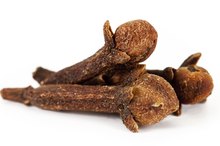What does fact checked mean?
At Healthfully, we strive to deliver objective content that is accurate and up-to-date. Our team periodically reviews articles in order to ensure content quality. The sources cited below consist of evidence from peer-reviewed journals, prominent medical organizations, academic associations, and government data.
The information contained on this site is for informational purposes only, and should not be used as a substitute for the advice of a professional health care provider. Please check with the appropriate physician regarding health questions and concerns. Although we strive to deliver accurate and up-to-date information, no guarantee to that effect is made.
Allergies to Cloves
Clove is a highly aromatic herb, widely used as a spice in cooking, as an ingredient in fragrances and as an herbal remedy for varied ailments. Many processed foods and products use trace amounts of clove oil, derived from the plant. Individuals with an allergy to cloves usually react to the oil itself, making it important to read ingredient lists carefully. Before using any herbal remedies, including cloves, consult with your primary medical provider.
Allergic Reactions
The eugenol oil present in cloves can cause irritation to the skin or the inside of the mouth, if taken orally 2. Symptoms of an allergic reaction may include pain, redness or irritation, swelling or even a fever. Consult your primary care physician if you notice severe symptoms, or if they do not clear up within a week. An allergy to eugenol oil is particularly likely among those with allergies to balsam of Peru, a natural flavoring and fragrance derived from the bark of the tree species Myroxolon balsamum 2.
Products to Avoid
What Are the Dangers of Ingesting Clove Oil?
Learn More
Besides pure clove oil or the raw spice, clove finds its way into a wide range of products. Mixed herbal remedies designed to treat upset stomachs, diarrhea, tooth or gum pain or halitosis may contain clove or clove oil. Beverages and processed foods may contain trace amounts of clove oil for flavoring. Toothpaste, soap, perfume and even cigarettes may also contain clove. In most cases, the ingredient serves to flavor or add fragrance. In the case of cigarettes, the eugenol is meant to soften the tobacco taste.
- Besides pure clove oil or the raw spice, clove finds its way into a wide range of products.
- Beverages and processed foods may contain trace amounts of clove oil for flavoring.
Eugenol Overdose
Even if you aren't allergic to cloves, you may still experience negative and potentially dangerous health effects from excessive quantities of cloves or products containing eugenol oil 2. Excessive eugenol intake can affect breathing, urination and digestion. Symptoms may include coughing up blood, diarrhea, abdominal pain, vomiting, nausea, liver failure, dizziness, seizures or coma. Immediately seek emergency assistance if you have ingested a large amount of a product containing cloves. Medical responses may include endoscopy, assisted breathing, gastric lavage and medication. Keep products containing cloves away from children to avoid accidental ingestion.
- Even if you aren't allergic to cloves, you may still experience negative and potentially dangerous health effects from excessive quantities of cloves or products containing eugenol oil 2.
- Excessive eugenol intake can affect breathing, urination and digestion.
Individuals at Risk
The Toxicity of Linseed Oil
Learn More
Besides those with allergies to balsam of Peru, several groups are well-advised to avoid using clove products. Young children tend to react more negatively. If you have kidney or liver problems, you may be more susceptible to negative effects. You should also avoid taking medicinal quantities of clove oil if you are pregnant or nursing. Because eugenol can slow blood clotting, avoid clove products if you have a bleeding disorder or are about to undergo surgery.
- Besides those with allergies to balsam of Peru, several groups are well-advised to avoid using clove products.
Related Articles
References
- Medline Plus: Clove
- Medline Plus: Eugenol Oil Overdose
- Mohan R, Jose S, Mulakkal J, Karpinsky-semper D, Swick AG, Krishnakumar IM. Water-soluble polyphenol-rich clove extract lowers pre- and post-prandial blood glucose levels in healthy and prediabetic volunteers: an open label pilot study. BMC Complement Altern Med. 2019;19(1):99. doi:10.1186/s12906-019-2507-7
- Alqareer A, Alyahya A, Andersson L. The effect of clove and benzocaine versus placebo as topical anesthetics. J Dent. 2006;34(10):747-50. doi:10.1016/j.jdent.2006.01.009
- Krasnova TN, Samokhodskaya LM, Ivanitsky LV, et al. Impact of interleukin-10 and interleukin-28 gene polymorphisms on the development and course of lupus nephritis. Ter Arkh. 2015;87(6):40-44. doi:10.1080/09540105.2017.1320357
- Hu Q, Zhou M, Wei S. Progress on the Antimicrobial Activity Research of Clove Oil and Eugenol in the Food Antisepsis Field. J Food Sci. 2018;83(6):1476-1483. doi:10.1111/1750-3841.14180
- Du WX, Olsen CW, Avena-bustillos RJ, Mchugh TH, Levin CE, Friedman M. Effects of allspice, cinnamon, and clove bud essential oils in edible apple films on physical properties and antimicrobial activities. J Food Sci. 2009;74(7):M372-8. doi:10.1111/j.1750-3841.2009.01282.x
- Nathan M. The Complete German Commission E Monographs: Therapeutic Guide to Herbal Medicines. Annals of Internal Medicine. 1999;130(5):459. doi:10.7326/0003-4819-130-5-199903020-00024.
- Kumar, D., Tanwar, V.K. Utilization of clove powder as phytopreservative for chicken nuggets preparation. Journal of Stored Products and Postharvest Research. 2011. Vol. 2(1): 11-14.
- Thapa D, Losa R, Zweifel B, Wallace RJ. Sensitivity of pathogenic and commensal bacteria from the human colon to essential oils. Microbiology (Reading, Engl). 2012;158(Pt 11):2870-2877. doi:10.1099/mic.0.061127-0
- Brown SA, Biggerstaff J, Savidge GF. Disseminated intravascular coagulation and hepatocellular necrosis due to clove oil. Blood Coagul Fibrinolysis. 1992;3(5):665-8. doi:10.1097/00001721-199210000-00025
- Lane BW, Ellenhorn MJ, Hulbert TV, Mccarron M. Clove oil ingestion in an infant. Hum Exp Toxicol. 1991;10(4):291-4. doi:10.1177/096032719101000410
- U.S. Food and Drug Administration. Family Smoking Prevention and Tobacco Control Act - An Overview.
Writer Bio
Danielle Hill has been writing, editing and translating since 2005. She has contributed to "Globe Pequot" Barcelona travel guide, "Gulfshore Business Magazine," "Connecting Lines: New Poetry from Mexico" and "The Barcelona Review." She has trained in neuro-linguistic programming and holds a Bachelor of Arts in comparative literature and literary translation from Brown University.









